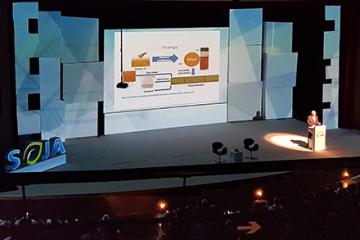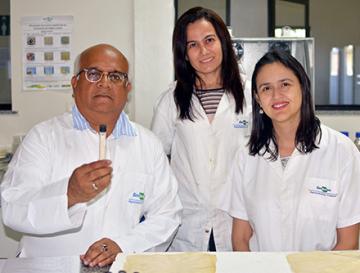Scientist of Many Talents Champions Planet-Friendly Products

Atanu Biswas discusses the state of global and USDA soybean oil research as the opening keynote presenter during the Brazilian Soybean Conference, June 11, 2018 in Goiânia, Brazil. (Photo courtesy of Atanu Biswas, ARS)
Atanu Biswas is as versatile as the soybeans he works with: chemist for the Agricultural Research Service (ARS), he is also a one-time Bengali music producer, an artist, and an advocate for workplace and cultural diversity.
The soybean, a member of the legume family, is known as the “Miracle Crop” for the diverse food and non-food uses that can be gleaned from it – especially its oil- and protein-rich seed. Animal feed, salad dressing, margarine, soymilk, tofu, building composites, adhesive, ink, cosmetics, crayons, and biodiesel fuel are but a few examples.
Biswas, who is with the ARS National Center for Agricultural Utilization Research in Peoria, IL, is part of a large team of scientists tasked with investigating new, value-added uses for both up-and-coming crops and established ones, like soybean, which ranks second only to corn in terms of U.S. acreage planted and was valued at $46 billion in 2020.
The researchers are keen on using procedures that are sustainable, generating less downstream wastes that can ratchet up disposal costs or place a burden on the environment.

ARS chemist Atanu Biswas teamed with Embrapa researchers Roselayne Furtado and Marilia Albuquerque (standing) in Fortaleza, Brazil to develop cashew starch-based films for food packaging applications. (Photo courtesy of Atanu Biswas, ARS)
For his part, Biswas is using enzymes and other so-called “green chemistry” instead of harsh solvents to catalyze reactions that can transform a raw commodity like soy oil into entirely new materials. These include self-curing bio-based resins, gels, and sealants (such as those used for medical and dental applications). The team also had a patent on a green reaction procedure for converting epoxidized soy oil into additives that can improve the heat resistance and other properties of mechanical lubricants.
In yet another approach, Biswas’ group is using microwave energy to kick-start reactions that can render soy oil, corn starch, or cellulose (a component of plant cell walls) into environmentally-friendly biopolymers for use in plastics, coatings, films, and other products typically derived from petrochemicals.
“Agricultural commodities such as soybean oil, starch, or cellulose can all be chemically transformed via various chemical reactions using conventional heating for industrial applications,” explained Biswas. “However, microwave reactors allow for increasing yields of biobased material while significantly reducing reaction times – typically from days or hours to minutes or even seconds, thus saving both time and energy.”
He is especially interested in creating biopolymers that will help improve the biodegradability of packaging for a group of non-durable, household products known as FMCGs – short for “fast-moving consumer goods.” These include non-biodegradable packaging materials for food, beverages, toiletries, candies, dry goods, cosmetics, and other consumables that are used once and discarded.

Dr. Biswas (left) and his wife (right) pictured with Biswas Records CD covers. (Photo courtesy of Atanu Biswas, ARS)
“The biobased plastics we’re working on decompose in just a few months depending on several factors, such as the nature of the bioplastic, temperature, microbes present in soil, rate of aeration, and moisture present,” said Biswas.
Though that’s relatively short compared to some petrochemical-based plastics, the use of biopolymers shouldn’t be considered a panacea, he cautioned. Rather, they should be viewed as part of a larger circular economy in which plastics pollution of the environment is reduced through recycling, reuse, and repurposing of discarded products, among other measures.
Like his transformative work, Biswas is truly a renaissance man. Before joining ARS, he owned a record label, Biswas Records, that distributed more than 220 albums of traditional Bengali music worldwide. He’s also an artist, with his research-themed pieces ending up on the covers of several scientific journals.
Whether it’s art, music, or science, Biswas values collaboration and the exchange of new ideas. For example, under a 2020 Fulbright Scholar Award from the U.S. Department of State, Biswas worked with scientists from the Brazilian Agricultural Research Corporation on ways to improve the properties of edible films made from shrimp chitin, cashew nut byproducts, sugarcane, and other commodities.
In Biswas’s eyes, the Fulbright Award afforded a unique opportunity to synergize agricultural research of mutual interest to both the United States and Brazil.
"Bio-based polymers created from soybean oil and corn can replace synthetic products such as polyethylene bags and polystyrene foam packing materials, reducing reliance on petroleum, reducing pollution through improved biodegradability, and increasing demand for agricultural products from both U.S. and Brazilian farmers," he said. – By Jan Suszkiw, ARS Office of Communications.
You May Also Like

